|
|
|
Sort Order |
|
|
|
Items / Page
|
|
|
|
|
|
|
| Srl | Item |
| 1 |
ID:
047344
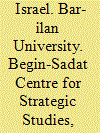

|
|
|
|
|
| Publication |
Ramat Gan, BESA Center for Strategic Studies, 2001.
|
| Description |
92p.
|
| Contents |
Reprinted with permission from Middle Eastern Studies, Vol. 37, No. 2
|
|
|
|
|
|
|
|
|
|
|
|
Copies: C:1/I:0,R:0,Q:0
Circulation
| Accession# | Call# | Current Location | Status | Policy | Location |
| 044801 | 355.03109561/BEN 044801 | Main | On Shelf | General | |
|
|
|
|
| 2 |
ID:
053964
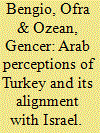

|
|
|
|
|
| Publication |
Ramat Gan, BESA Center for Strategic Studies, 2001.
|
| Description |
92p.
|
| Series |
Mideast security and policy studies; no.48
|
| Contents |
Reprinted with permission form Middle Eastern Studies, Vol. 37, No.2
|
|
|
|
|
|
|
|
|
|
|
|
Copies: C:1/I:0,R:0,Q:0
Circulation
| Accession# | Call# | Current Location | Status | Policy | Location |
| 045155 | 355.03109561/BEN 045155 | Main | On Shelf | General | |
|
|
|
|
| 3 |
ID:
128225
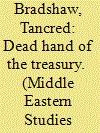

|
|
|
|
|
| Publication |
2014.
|
| Summary/Abstract |
This paper addresses an aspect of British policy in the Trucial States that has received scant scholarly attention. It examines British attempts to promote economic and social development in the Trucial States, and places this policy within the context of British attitudes towards the economic development of the colonial empire. During the 1950s Britain's interest in the Arabian Peninsula expanded, in notable contrast with the rest of the Middle East. One aspect of this expanded role was British efforts to improve the economic and social conditions prior to the discovery of oil in Abu Dhabi in 1958. British officials on the ground were concerned to improve the lot of the population of these impoverished shaikhdoms for a combination of political and strategic and ethical reasons. This article shows that attempts to introduce a modicum of economic and social development in the Trucial States were hindered by the Treasury's refusal to provide adequate funds, and because of inherent problems in finding suitable development projects. Nonetheless, the plans put in place during the 1950s did provide the foundations for subsequent development programmes, which, in turn, drastically expanded as a result of oil wealth.
|
|
|
|
|
|
|
|
|
|
|
|
|
|
|
|
| 4 |
ID:
129677
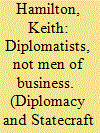

|
|
|
|
|
| Publication |
2014.
|
| Summary/Abstract |
In the aftermath of the Great War, British diplomats were criticised for their earlier failure to pay due attention to international economic developments. However, as this essay reveals, in an effort to contain Germany's peaceful penetration of Ottoman Turkey after May 1906, Britain's foreign secretary, Sir Edward Grey, was ready to commit his department's Secret Service money to the joint Anglo-French purchase of the Constantinople Quays Company. The venture proved less than profitable, and it was not, as some diplomats hoped, the precursor of a successful "industrial entente" between Britain and France in the Near East. Indeed, if anything, it highlighted the difficulties faced by diplomats in seeking to reconcile the interests of business and state in the conduct of foreign policy.
|
|
|
|
|
|
|
|
|
|
|
|
|
|
|
|
| 5 |
ID:
134750
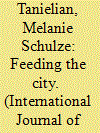

|
|
|
|
|
| Summary/Abstract |
World War I in the Ottoman Empire was a humanitarian disaster of unprecedented scale. By 1916 in the Greater Syrian provinces, men, women, and children were dying en masse of a war-induced famine so devastating that popular memory still names this war ḥarb al-majāʿa (the war of famine). Despite the civilian catastrophe, people's experiences on the Ottoman home front have been only marginally explored in the scholarship. Focusing on the city of Beirut, this article highlights the centrality of food provisioning in the competition for political legitimacy in the provincial capital. Through a detailed analysis of how the Beirut municipality was represented in the city's daily newspaper al-Ittihad al-ʿUthmani, I argue that for local reform-minded notables and intellectuals the war presented an opportunity to prove, both to the local population and to the Ottoman state, that issues related to the internal security and well-being of the Beirut province generally and the city specifically could be dealt with locally through existing governing bodies. The article thus traces the fierce political games played around the issue of food by various actors seeking to win the hearts of Beirutis through their stomachs.
|
|
|
|
|
|
|
|
|
|
|
|
|
|
|
|
| 6 |
ID:
133823
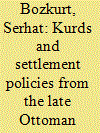

|
|
|
|
|
| Publication |
2014.
|
| Summary/Abstract |
This article highlights the continuities and discontinuities between the settlement policies of the late Ottoman state and early Republican Turkey. It argues that although there was a certain degree of evolution in the language employed by the state between the late Ottoman and Republican periods, there is a significant amount of overlap between the policies pursued by the Committee of Union and Progress which seized power in 1913 and the Kemalist regime established in the early 1920s towards the Kurds. In short, the emergence of settlement policies aimed at assimilating the Kurds into the Turkish nation are not an innovation of the Kemalists; it is possible to trace them to the late Ottoman period. This is substantiated through a comparison of two laws relating to settlement; the 1916 "Ordinance Outlining the Transfer and Settlement as well as the Sustenance and Maintenance for Refugees arriving from Conflict Zones" prepared by the Ottoman Ministry of the Interior's General Directorate for Tribes and Refugees and the Settlement Law of 1934, which was implemented in Republican Turkey and which remained on the statute books until 2006.
|
|
|
|
|
|
|
|
|
|
|
|
|
|
|
|
| 7 |
ID:
149089
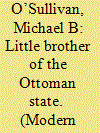

|
|
|
|
|
| Summary/Abstract |
By charting the activities of Ottoman experts in Afghanistan from 1908–23, this article demonstrates how their arrival precipitated a series of state-building practices rooted in the particular historical experience of Ottoman reform projects. The country thus became the object of an Ottoman mission civilisatrice and the beneficiary, in the eyes of certain figures within the Ottoman Committee of Union and Progress, of an avowedly Ottoman-Turkish modernity. Sharing this conviction were members of the Afghan royal family and its chief ministers, especially Maḥmūd Ṭarzī, who first invited the Ottoman advisers to Kabul. The provision of Ottoman technical assistance took a variety of forms, but is most evident in military, educational, and public health reforms enacted in Kabul in this period. Through the study of previously unexamined Ottoman, Afghan, and British sources, the aim here is to incorporate these events into discussions of Ottoman informal empire, Afghan developmentalism, and pan-Islam.
|
|
|
|
|
|
|
|
|
|
|
|
|
|
|
|
| 8 |
ID:
128210
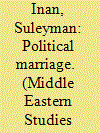

|
|
|
|
|
| Publication |
2014.
|
| Summary/Abstract |
Under the influence of popular history, recent historiography on the Ottomans has focused mainly on such subjects as the influence of women on politics and indirectly on issues of the harem. However, such a focus indicates limited information and an insufficient number of studies on the sons-in-law in the dynasty of the late Ottoman state. The purpose of this article is to develop a theoretical framework concerning sons-in-law in the dynasty of the late Ottoman state period by collating the related but limited references in the historical sources. In this context, such issues as the policy of marriage in the Ottoman dynasty, the status of the dynasty sons-in-law, and the privileges they had are studied in terms of the late period of the Ottomans. Thus, the study's major purpose is to discuss the late Ottoman history in the light of such an important but ignored subject.
|
|
|
|
|
|
|
|
|
|
|
|
|
|
|
|
|
|
|
|
|